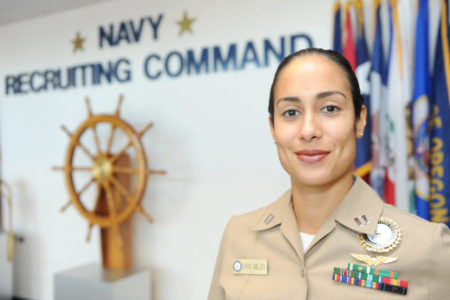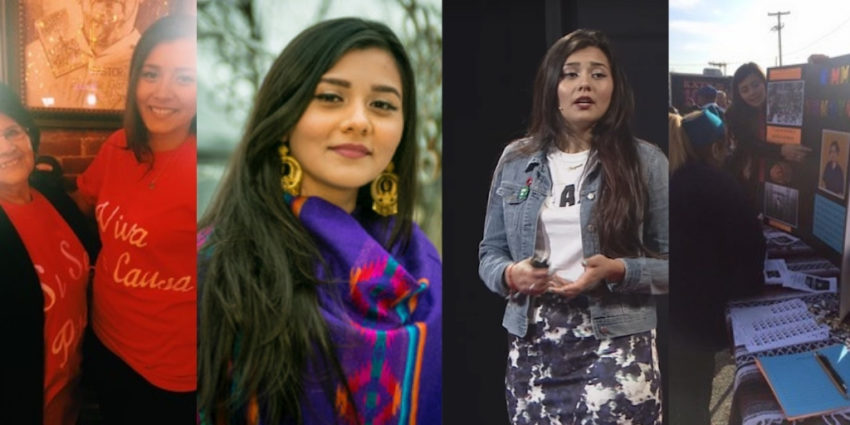
Share On Social!
Denise Hernández is a proud Chicana and a 5th generation San Antonian.
She is the founder of Maestranza, an organization based in San Antonio that empowers community members through education, activism, and collaboration with other local social justice groups.
She also coordinates events and constituent services for San Antonio City Councilman Roberto Treviño.
MySA named her a “Rising Star in Their 20s.” She’s led speaker series, workshops, and even a TEDx talk.
Denise Hernández is an educator, activist, and advocate for her community. And at only 29 years old, she’s just getting started.
But the journey here was anything but easy. It took years of self-discovery, unlearning biases, and confronting the discrimination that her family has faced for generations.
Growing up in San Antonio
Hernández’s experience growing up in San Antonio, Texas, played a large role in shaping her upbringing.
“Although we were maybe considered poor or lower class, we had everything we needed because we had a lot of care and love from our neighbors and our families. I grew up in a culturally rich area. If you know San Antonio, it’s like 65% Latinx, primarily Mexican American. So I grew up surrounded by folks who I felt understand me,” Hernández said.
Years later, this experience motivated Hernández to get involved advocating for her community, working on infrastructure, and later helping create policy that affects downtown San Antonians through event coordinating with Councilman Treviño’s office. She is grateful for the opportunity to influence policies that affect San Antonians in the heart of the city.
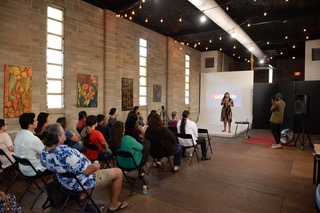
“My center of my work is always about making sure San Antonians have a seat at the table in our decision-making processes. I feel like San Antonio has historically been manipulated to fit an idea of certain kind of folks who are in power and want to keep it that way. But we can have that seat at the table. We can create a whole new table that influences change,” Hernández said.
But before all that, Hernández actually wanted to become a doctor.
Hernández went to Baylor University in 2009 to pursue a degree in medicine and become a thoracic cardiologist.
But early on in her education, she realized medicine wasn’t in the cards for her.
“I knew my sophomore year that I didn’t want to be a doctor and only because – and maybe this is bad – I saw people who wanted it more,” Hernández said. “I was doing it because I wanted to be a brown girl who ‘became successful.’ And to me, being a doctor is the most successful you can be. And I think that’s still true. But now I have a different idea of success.”
She now thinks of success as being a trusted member of her community and finds joy in helping others come to terms with their identity.
“It’s a different kind of healing of the heart,” Hernández said.
Unfortunately, discrimination marred much of her time at Baylor.
Facing Discrimination and Bias That Led to Her Cultural Awakening
While attending Baylor, Hernández encountered racism and discrimination.
“It was admittedly the first time I had experienced overt racism. I was distinctly targeted for being Mexican and for being a woman and being opinionated,” Hernández said. “In my ignorance of never having left San Antonio or lived anywhere else, I just assumed that I could operate in the same way at school, in a primarily white, very conservative space. I learned very quickly that that wasn’t the case.”
The experience fueled Hernández’s desire to connect with her roots.
“It was traumatic at times and very hard. If anything, the one positive I take out of that is that it did propel me. It was a catalyst for me to learn more about who I am, my people, and to find pride in that, so it couldn’t be taken from me ever again,” Hernández said.
Finding Her Identity as a Chicana
Her experiences with racism at Baylor, where she graduated in 2013, led Hernández to discover more about herself and her family history.
“I didn’t have an identity aside from being my mother’s daughter and being from San Antonio. I didn’t know that I was Chicana. I didn’t have a political identity,” Hernández said.
She began to read about Chicano history and watch documentaries.
Part of Hernández’s self-discovery was learning how unique her experience as a Mexican American, or Chicana, is. Rather than identify as Latina, Hernández chooses to embrace the diversity within Latino culture and celebrate her Chicana roots.
“We are not a monolith. We all come from different cultural, sociopolitical identities. Cubans have a completely different political identity in a large part than Mexican Americans do in Texas. I can only speak to being a Mexican American in Texas. But I know our politics are going to be way different than a Puerto Rican in New York,” Hernández said.
But as she was reading about Mexican American history and culture, she wanted to see how it compared with the experiences of her own family members.
So she sat down with her grandparents.
“I had to interview my grandparents and other family members and say, ‘Hey, did you face this kind of discrimination? Because I’m reading about it in a book and watching a video about it online.’ To know that it actually directly affected my family was a whole different thing,” Hernández said.
Hernández learned how her Mexican family had to assimilate to white San Antonio culture.
“My grandpa and my grandma didn’t speak Spanish in school because they were beaten for it,” Hernández said.
As a result, Hernández was never taught Spanish by her family because they thought she would be better off not knowing it.
Hernández’s grandfather also told her about the discrimination he faced.
“He told me he was in a gang when he was in high school. He was profiled a number of times for stealing or other crime. He told me, ‘It was never me. I was in it for the friendship; I didn’t commit crime.’ But he was always constantly being harassed by police or by authority figures,” Hernández said.
This changed how she viewed her community and helped her understand how poverty and systemic racism have affected the low-income Latino neighborhoods of San Antonio for generations.
“It was hard. It took a lot of internal introspection,” Hernández said. “It still takes a lot of work for me to shed some of the anger to get to the point and think, ‘Here’s the solution and here’s how we can all work together for a better solution where we are all empowered on our own just by knowing who we are.’”
Founding Maestranza in San Antonio
Learning about her family history was vital for Hernández’s discovery of her Chicana identity. She wanted other folks to feel the same.
So she founded Maestranza in 2015 to spread educational material and empower those around her.
Hernández leads through her speaking events and connecting others to local activism.
“I go and speak to schools— elementary, middle, high schools. I’ve spoken to the Women’s Chamber of Commerce about implicit bias. I do a lot of educating about that. A big piece now is for folks asking, ‘How do I get plugged in to activism in San Antonio and advocate for my community?’ So I try to share those events and connect people to those organizations,” Hernández said.
One of Maestranza’s main events is Sabiduría.
“With Maestranza, last year I started a speaker series called Sabiduría. It was highlighting 5 San Antonians — didn’t need to be born and raised here — who wanted to share their perspective on their city. It could’ve been any story about anything,” Hernández said.
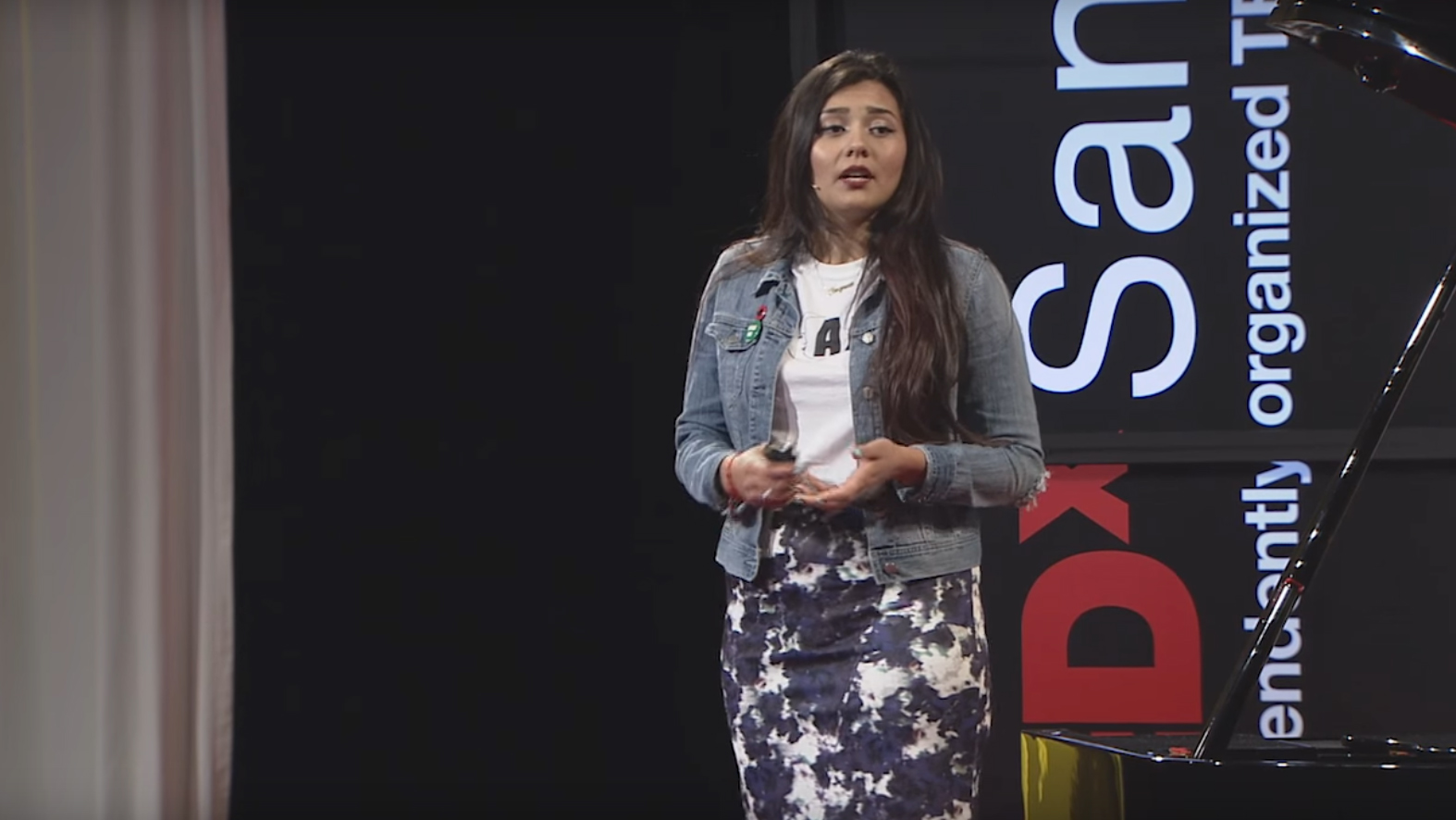
Hernández got the ideal for a local speaker series after her TEDx talk in 2015 titled Unpacking and Transforming Your Biases For A Better Community.
“I felt that the TED talk opened a lot of doors for me and was a great experience, but I feel like a lot of these speaker series tend to want to feature certain kinds of people,” Hernández said. “I wanted to open up Sabiduría to anybody. It didn’t matter what your job was, who you were, or what you look like. I just wanted San Antonians to speak. We got some really great stories the first round. We were gonna have a second one, but then COVID hit, so we didn’t get to do that.”
Hernández works with four other people at Maestranza to coordinate events with other organizations.
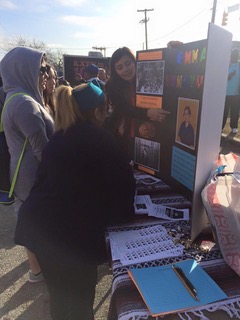
“I’ve worked with The Down Market and Southwest Workers Union. I’ve worked with a few other organizations where we have a common goal, and we organize events together or uplift each other. The Down Market does a lot of media production, so they’ve helped me with that,” Hernández said.
But since starting work at Councilman Treviño’s office two years ago and the COVID-19 pandemic, her work at Maestranza has slowed.
Hernández isn’t sure what she wants the future of Maestranza to look like.
“I don’t know where I want it to go. People ask me, ‘Do you want it to be a 501(c)(3)?’ And I don’t know if I need to do that. Personally, I feel like there are a lot of organizations doing a lot of work, so maybe we can just merge together. We’ll see how it goes,” Hernández said.
Discovering Implicit Bias
Understanding implicit bias has been at the root of Hernández’s learning and unlearning about her identity and culture.
She admits that even since she gave her TEDx talk in 2015, her idea of implicit bias has changed.
“In that point in time, implicit bias always meant to me that there is a root cause to an issue. We can get through all of this muck, but there’s always a seed. There’s always something that this stems from and I wanted to get to that root,” Hernández said.
Now her view has shifted to understand bias as the way we interact with the world.
“It’s how we navigate life as human beings and how we have for centuries just to survive. And now we’re in this space where it’s just constant media, media, media. It’s constantly influencing us,” Hernández said.
Understanding her own implicit bias helped Hernández form better connections with others.
“For me, understanding my biases helped me better interact with other people. When I made an immediate judgement on someone, I’d be like wait, why am I reacting this way? Where is this coming from?” Hernández said.
Hernández had to come to terms with her unconscious self-hatred for her skin color.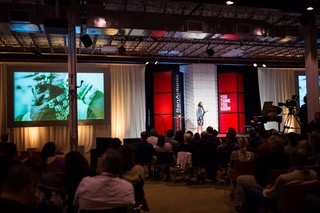
“A lot of that internalized bias for myself is that I grew up not wanting to be brown. I would go to the beach in a hoodie and jeans because I didn’t want to get darker, because I thought getting darker was ugly. I didn’t like the way I looked,” Hernández said.
Her internalized bias against her skin color persisted until she came home from Baylor and dove into researching her family and heritage.
“It took coming back and learning my people are powerful and they are beautiful and they are strong. And it didn’t need to be just physical beauty, it meant so much more and it wasn’t so superficial. It’s been a lot of unlearning,” Hernández said.
Hernández understands that it can be difficult for people to accept their implicit biases, but once they do, it will be easier to move forward.
Salud America! can help you in this journey. Download our free Action Pack “Find Out If You Have Implicit Bias and What to Do Next” to see if you have implicit bias, learn from others who have overcome their own implicit bias, and encourage others to learn about implicit bias, too.
“Biases are really hard for people. You think, ‘Oh I’m not racist! I’m not sexist! I’m not this, this, this.’ But when you really get down to it, you are. And that’s OK! Everybody is at some level. Once we recognize it is when we can begin to change it,” Hernández said.
Confronting Your Own Biases and Finding Your Identity
Hernández’s recommendation for embracing your heritage and confronting your biases?
“Loving yourself is the first revolution,” she said.
Finding your people, whether your relatives or trusted community members, is the next step.
“I just fully recommend talking to your family members. Talk to your elders if your family isn’t around anymore. Find an elder in your community who you trust and look up to and ask them their experiences. Ask them what it was like growing up. What were you like when you were 20? What were you like when you were my age?” Hernández said.
Making these connections will not only help you find your own identity, but also confront the way you treat others.
“It humanizes each other. I think we lack so much connection these days. We’re so quick to label people — this, this, this. It kind of determines how we navigate society. But it doesn’t have to, if I can have a real conversation about who you are,” Hernández said.
Beyond making these connections in your community, reading about the history and legacy of your community leaders can help shape the path forward.
“Reading Chicana/Chicano history really helped me see that the work that I was doing and wanted to do, that a lot of it had already been done,” Hernández said. “It was just connecting with those folks and learning from them so that we can take it to the next level. Then our youth can carry that on.”
Hernández recognizes that it can be overwhelming for people to come to terms with their identity and learn how to find their voice, especially it comes to voicing your opinion in an election.
“So many people get frustrated. They think, ‘Why am I going to vote? Why am I going to do this or that when nothing changes?’ Because we have to change it. We have to show our power. It’s not always easy or fun. It’s not always cute or pretty to put on Instagram. But it is important,” Hernández said.
Hernández urges us to start small.
“For me, it comes down to a conversation. Just be vulnerable,” Hernández said. “It’s hard sometimes. But being vulnerable opens us to a space where we can learn more about each other and ourselves and get to that space of self-love and self-fulfillment. And with that, the world is yours.”
Explore More:
Overcoming Harmful BiasesBy The Numbers
3
Big Excuses
people use to justify discriminatory behavior
This success story was produced by Salud America! with support from the Robert Wood Johnson Foundation.
The stories are intended for educational and informative purposes. References to specific policymakers, individuals, schools, policies, or companies have been included solely to advance these purposes and do not constitute an endorsement, sponsorship, or recommendation. Stories are based on and told by real community members and are the opinions and views of the individuals whose stories are told. Organization and activities described were not supported by Salud America! or the Robert Wood Johnson Foundation and do not necessarily represent the views of Salud America! or the Robert Wood Johnson Foundation.



